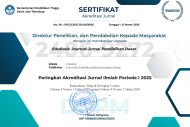Schooling But Not Learning: Exploring the Social and Psychological Factors Affecting Children’s Engagement in Learning
Abstract
The phenomenon of "schooling but not learning" highlights the gap between attendance and learning outcomes, necessitating a deeper understanding of social and psychological factors to enhance basic education quality. This study examines social and psychological determinants of the “schooling but not learning” phenomenon among elementary students in Ngada Regency, Indonesia, using a mixed-methods design. Participants comprised 200 students, 21 teachers, and 195 parents. The qualitative data (observations and semi-structured interviews) were thematically analysed, and the teacher–parent questionnaires were analysed quantitatively using means and standard deviations. Quantitatively, teachers reported greater difficulty with student attention than parents (M=3.19 vs. 2.91). At the same time, both groups rated family influence on engagement as high (4.57 vs. 4.08) and perceived teacher support as adequate (3.86 vs. 4.00). The anxiety was rated comparatively low overall (2.62 vs. 2.43), and school climate was viewed as inclusive (4.00 vs. 4.02). The importance of parental involvement received the highest endorsement (4.86 vs. 4.62), yet the current learning model was judged least responsive to socio-psychological needs (1.76 vs. 2.49). These patterns indicate that engagement barriers are concentrated in attention and motivation within generally supportive family–school contexts, and that instructional models require redesign to address students’ socio-psychological needs better. Practical implications for adaptive classroom management, family–school collaboration, and targeted counseling resources to strengthen engagement and learning outcomes are outlined.
Keywords
Full Text:
PDFReferences
Alfarizi, M., Nasihudin, N., & Mahmud, M. R. (2024). Pengembangan media pembelajaran Augmented Reality (AR) untuk meningkatkan hasil belajar siswa pada pelajaran IPA. Jurnal Riset dan Inovasi Pembelajaran, 4(3), 1989–2000.
Anggraeni, R., Andriana, E., & Syachruroji, A. (2024). Pengembangan media pembelajaran Augmented Reality untuk meningkatkan penguasaan materi sistem pernapasan manusia pada pembelajaran IPA kelas V SDN Serdang Kulon IV. Elementary School, 11(1), 161–170.
Botha, J., & Kourkoutas, E. (2015). A community of practice as an inclusive model to support children with social, emotional and behavioural difficulties in school contexts. International Journal of Inclusive Education, 20(7), 784–799.
Braun, V., & Clarke, V. (2006). Using thematic analysis in psychology. Qualitative Research in Psychology, 3(2), 77–101.
Carera, A., Kurniayati, H., Ansyori, I., & Seruni, M. B. A. (2025). Efektivitas penggunaan Augmented Reality (AR) dalam meningkatkan perubahan energi pada siswa kelas 4 di SDN Karangduak 2. Jurnal Multidisiplin Ilmu Akademik, 2(1) 562–568.
Cheng, L., Zhang, X., Lin, J., Dong, Y., Zhang, J., & Tong, Z. (2022). Social-emotional classroom climate and academic achievement for Chinese elementary students: The roles of convergent and divergent thinking. School Psychology International, 44(3), 301–325.
Cloutier, M. H., Geven, K. M., Rogers, H., Fazili, S., Wong, Y. N., Akmal, M., Stacy, B., Sedmik, E., Shmis, T., Tran, N. T. A., Asad, S., Clarke, M., Liberman, J., Levin, V., Alvarez, H., Wane, W., Meky, M. S., & Kleczka, J. (2024). Learning poverty: Updates and revisions. Learning Poverty Monitoring Series Technical Note 5, 1–58.
Cosso, J., von Suchodoletz, A., & Yoshikawa, H. (2022). Effects of parental involvement programs on young children’s academic and social–emotional outcomes: A meta-analysis. Journal of Family Psychology, 36(8), 1329–1339.
Daily, S. M., Mann, M. J., Lilly, C. L., Dyer, A. M., Smith, M. L., & Kristjánsson, Á. L. (2020). School climate as an intervention to reduce academic failure and educate the whole child: A longitudinal study. Journal of School Health, 90(3), 182–193.
Deslauriers, L., McCarty, L. S., Miller, K., Callaghan, K., & Kestin, G. (2019). Measuring actual learning versus feeling of learning in response to being actively engaged in the classroom. Proceedings of the National Academy of Sciences, 116(39), 19251–19257.
Dignath, C., Rimm-Kaufman, S., van Ewijk, R., & Kunter, M. (2022). Teachers’ beliefs about inclusive education and insights on what contributes to those beliefs: A meta-analytical study. Educational Psychology Review, 34(4), 2609–2660.
Durlak, J. A., Weissberg, R. P., Dymnicki, A. B., Taylor, R. D., & Schellinger, K. B. (2011). The impact of enhancing students’ social and emotional learning: A meta-analysis of school-based universal interventions. Child Development, 82(1), 405–432.
Flores, J., Caqueo-Urízar, A., López, V., & Acevedo, D. (2022). Symptomatology of attention deficit, hyperactivity and defiant behavior as predictors of academic achievement. BMC Psychiatry, 22, 61.
Godwin, K. E., Almeda, M. V., Seltman, H., Kai, S., Skerbetz, M. D., Baker, R. S., & Fisher, A. V. (2016). Off-task behavior in elementary school children. Learning and Instruction, 44, 128–143.
Guo, P., Saab, N., Post, L. S., & Admiraal, W. (2020). A review of project-based learning in higher education: Student outcomes and measures. Teaching and Teacher Education, 89, 102966.
Havik, T., Bru, E., & Ertesvåg, S. K. (2014). Parental perspectives of the role of school factors in school refusal. Emotional and Behavioural Difficulties, 19(2), 131–153.
Hill, N. E., & Tyson, D. F. (2009). Parental involvement in middle school: A meta-analytic assessment of the strategies that promote achievement. Developmental Psychology, 45(3), 740–763.
Janus, M., Ryan, J., Pottruff, M., Reid-Westoby, C., Brownell, M., Bennett, T., Birken, C. S., Duku, E., Ferro, M. A., Forer, B., Georgiades, S., Gorter, J. W., Guhn, M., Maguire, J., Manson, H., Pei, J., Santos, R., & Coplan, R. J. (2023). Population-based teacher-rated assessment of anxiety among Canadian kindergarten children. Child Psychiatry & Human Development, 54(5), 1309–1320.
Kelty, N. E., & Wakabayashi, T. (2020). Family engagement in schools: Parent, educator, and community perspectives. SAGE Open, 10(4), 1–13.
Konold, T., Cornell, D., Jia, Y., & Malone, M. (2018). School climate, student engagement, and academic achievement: A latent-variable, multilevel, multi-informant examination. AERA Open, 4(4), 1–17.
Krämer, S., Möller, J., & Zimmermann, F. (2021). Inclusive education of students with general learning difficulties: A meta-analysis. Review of Educational Research, 91(3), 432–478.
Lakkala, S., Galkienė, A., Navaitienė, J., Cierpiałowska, T., Tomecek, S., & Uusiautti, S. (2021). Teachers supporting students in collaborative ways—An analysis of collaborative work creating supportive learning environments for every student in a school: Cases from Austria, Finland, Lithuania, and Poland. Sustainability, 13(5), 2804.
Leff, S. S., Thomas, D. E., Shapiro, E. S., Paskewich, B., Wilson, K., Necowitz-Hoffman, B., & Jawad, A. F. (2011). Developing and validating a new classroom climate observation assessment tool. Journal of School Violence, 10(2), 165–184.
Ministry of Basic and Secondary Education. (2024). Data Rapor Pendidikan Indonesia 2023. Ministry of Basic and Secondary Education.
Mpu, Y., & Adu, E. O. (2021). The challenges of inclusive education and its implementation in schools: The South African perspective. Perspectives in Education, 39(2), 225–238.
Murray, A. L., Booth, T., Ribeaud, D., & Eisner, M. (2018). Disagreeing about development: An analysis of parent–teacher agreement in ADHD symptom trajectories across the elementary school years. International Journal of Methods in Psychiatric Research, 27(3), e1723.
OECD. (2023). PISA 2022 Results (Volume I): The State of Learning and Equity in Education. OECD Publishing.
Pulimeno, M., Piscitelli, P., Colazzo, S., Colao, A., Miani, A. (2020). School as ideal setting to promote health and wellbeing among young people. Health Promotion Perspectives, 10(4), 316–324.
Qorib, M. (2024). Analysis the impact of differentiated instruction on critical diversity literacy in inclusive education. Aksaqila International Humanities and Social Sciences Journal, 3(1), 1–19.
Rapp, A. C., & Corral-Granados, A. (2024). Understanding inclusive education–a theoretical contribution from system theory and the constructionist perspective. International Journal of Inclusive Education, 28(4), 423–439.
Rasmitadila, R., Widyasari, W., Prasetyo, T., Rachmadtullah, R., Samsudin, A., & Aliyyah, R. R. (2021). General teachers’ experience of the brain’s natural learning systems-based instructional approach in inclusive classroom. International Journal of Instruction, 14(3), 95–116.
Van Ryzin, M. J., & Roseth, C. J. (2018). Cooperative learning in middle school: A means to improve peer relations and reduce victimization, bullying, and related outcomes. Journal of Educational Psychology, 110(8), 1192–1201.
Salas-Pilco, S. Z., Xiao, K., & Oshima, J. (2022). Artificial intelligence and new technologies in inclusive education for minority students: A systematic review. Sustainability, 14(20), 13572.
Shalini, S., Kaushik, P., & Sharma, R. K. (2024). Relationship between refusal to school and anxiety among typically developing children of age 12 to 15 years: A correlational study. Revista Electronica De Veterinaria, 25(1), 3074–3079.
Sheridan, S. M., Knoche, L. L., Kupzyk, K. A., Edwards, C. P., & Marvin, C. A. (2011). A randomized trial examining the effects of parent engagement on early language and literacy: The Getting Ready intervention. Journal of School Psychology, 49(3), 361–383.
Staff, A. I., Oosterlaan, J., van der Oord, S., van den Hoofdakker, B. J., & Luman, M. (2023). The relation between classroom setting and ADHD behavior in children with ADHD compared to typically developing peers. Journal of Attention Disorders, 27(9), 939–950.
Syriopoulou-Delli, C. K., Polychronopoulou, S. A., Kolaitis, G. A., Antoniou, A. G. (2019). Views of teachers on anxiety symptoms in students with Autism Spectrum Disorder. Journal of Autism Developmental Disorder, 49(2), 704–720.
Szumski, G., Smogorzewska, J., & Grygiel, P. (2022). Academic achievement of students without special educational needs and disabilities in inclusive education–Does the type of inclusion matter? PLOS ONE, 17(7), e0270124.
Tekin, I., Erden, S., Ayva, A. B. Ş., & Büyüköksüz, E. (2018). The predictors of school refusal: Depression, anxiety, cognitive distortion and attachment. Journal of Human Sciences, 15(3), 1519–1529.
Di Vincenzo, C., Pontillo, M., Bellantoni, D., Di Luzio, M., Lala, M. R., Villa, M., Demaria, F., & Vicari, S. (2024). School refusal behavior in children and adolescents: A five-year narrative review of clinical significance and psychopathological profiles. Italian Journal of Pediatrics, 50(1), 107.
Wiedermann, C. J., Barbieri, V., Plagg, B., Marino, P., Piccoliori, G., Engl, A. (2023). Fortifying the foundations: A comprehensive approach to enhancing mental health support in educational policies amidst crises. Healthcare, 11(10), 1423.
Ybañez, Y., Ponce, J., Recaña, J., Cañete, J. J., Opingo, K. M., & Mangubat, R. (2024). Parental engagement in supporting children with learning difficulties. British Journal of Teacher Education and Pedagogy, 3(2), 26–37.
Yulianti, K., Denessen, E. J. P. G., & Droop, W. (2019). Indonesian parents' involvement in their children's education: A study in elementary schools in urban and rural Java, Indonesia. School Community Journal, 29(1), 253–278.
Yunitasari, D., Lasmawan, I. W., Arnyana, I. B. P., & Ardana, I. M. (2025). Breaking barriers: Advancing inclusive education through early identification of learning challenges. Nazhruna: Jurnal Pendidikan Islam, 8(1), 139–153.
Zhang, L., & Ma, Y. (2023). A study of the impact of project-based learning on student learning effects: A meta-analysis study. Frontiers in Psychology, 14, 1202728.
DOI: https://doi.org/10.17509/ebj.v7i2.88741
Refbacks
- There are currently no refbacks.
Copyright (c) 2025 Universitas Pendidikan Indonesia
This work is licensed under a Creative Commons Attribution 4.0 International License.
This journal is indexed by




.png)




.png)
1.png)


1.png)

.png)